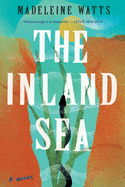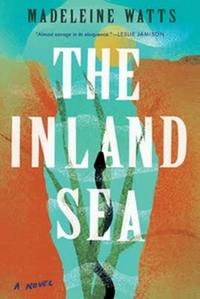
 One hundred twenty million years ago, during the Cretaceous period, a massive body of water called the Eromanga Sea bisected the continent of Australia; within it, a prehistoric ecosystem thrived. The specter of this sea has haunted the arid landscape since, leaving ancient clues in the form of backward-flowing rivers, opal mines and oil fields. This sea was a panacea in the minds of Australia's early nation-builders, who saw it as the key to the agricultural success of their nascent empire, and a dark portent for their descendants, now contending with the consequences of a stripped environment. In Madeleine Watts's debut novel, The Inland Sea, the great-great-great-great-granddaughter of explorer John Oxley deals with a messy post-college life in Sydney while the latent effects of his colonial gaze unfold around her.
One hundred twenty million years ago, during the Cretaceous period, a massive body of water called the Eromanga Sea bisected the continent of Australia; within it, a prehistoric ecosystem thrived. The specter of this sea has haunted the arid landscape since, leaving ancient clues in the form of backward-flowing rivers, opal mines and oil fields. This sea was a panacea in the minds of Australia's early nation-builders, who saw it as the key to the agricultural success of their nascent empire, and a dark portent for their descendants, now contending with the consequences of a stripped environment. In Madeleine Watts's debut novel, The Inland Sea, the great-great-great-great-granddaughter of explorer John Oxley deals with a messy post-college life in Sydney while the latent effects of his colonial gaze unfold around her.
To supplement her intermittent freelance writing, the unnamed narrator of The Inland Sea starts an ill-suited job at the telecom company where all of Australia's emergency calls are dispatched. She works odd hours, receiving only fragments of emergencies through her headset before transferring them to the proper channels. But it soon becomes clear that the car accidents, fires, freak storms, overdoses and inscrutable howls that fill her days leave a potent hangover. The novel is moody, progressing like a low-level fever as the narrator engages in the standard debauchery that defines the unmoored post-college years of many young adults. At the center of her unhealthy behavior is Lachlan, an ex-boyfriend she begins to sleep with again, despite the brutal circumstances of their split and his ongoing relationship with a friend of hers. The topography of the narrator's interpersonal life resembles that of Australia: "Lachlan," the narrator tells us, is not actually his real name. She named him after the river that once caused her grandfather John Oxley so much grief, as he believed its backward flow would yield to a body of water big enough to redeem the barren landscape. Lachlan's promise proves to be similarly false, as he turns out to be a symptom of her spiral rather than an antidote.
With The Inland Sea, Watts has produced a model of autofiction in the age of climate disaster, a genre sure to dominate the coming era. The motivating logic of the novel rests on a conflation of internal and external emergency that would likely ring true to many young adults. As the novel develops, it becomes clear that this is not a purely solipsistic device but, rather, a reflection of the permanent place the climate emergency holds in the minds of those who have grown up contending with its brutal realities. --Emma Levy, freelance writer
Shelf Talker: Introspective with a febrile realism that borders on the surreal, Madeleine Watts's The Inland Sea is as evocative and haunting as works by Samantha Hunt or Ottessa Moshfegh.

